Many people ask ‘why do I have chest pain? There are numerous reasons why you may have pain in the chest area and it doesn’t always mean you have something wrong with your heart.
There are many incidences where people think that they may be having a heart attack and I will be going through two of them further in this post. But first, I want to emphasise that if you are having any of the following symptoms, consult a doctor and/or call for an ambulance immediately:
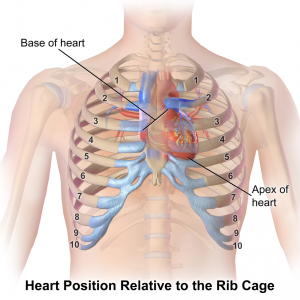
- chest pain
- pain in the upper back
- pain in the stomach, arms,
neck, jaw or even teeth - tightness in the chest
- feeling light headed or dizzy
- shortness of breath
- feeling clammy and sweaty
- feeling nauseous or vomiting
- feeling really unwell.
Symptoms vary from one person to another and often differ between men and women.
You’re not being a nuisance!
People are often worried about calling an ambulance or even their doctor, especially the elderly, who think they’re being a nuisance. Don’t delay, the medical profession do not mind false alarms. They prefer you to do something immediately if you are feeling unwell. It is their job to look after you, no matter if it’s indigestion or something more serious.
It is imperative that you look after your cardiovascular system by keeping your Mg levels up and not taking Calcium supplements unless you are lactose intolerant or do not eat dairy products. This post will explain why.
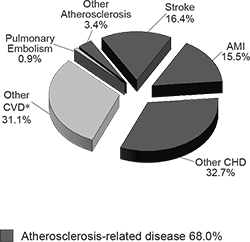 World statistics of cardiovascular disease:
World statistics of cardiovascular disease:
- The leading global cause of death is cardiovascular disease. This accounts for over 17 million deaths each year and the number is expected to increase to over 23 million by the year 2030.
- Nearly one third of global deaths is down to cardiovascular disease with a large percentage of those deaths being in low to middling income countries.
- Over three quarters of a million US citizens died from cardiovascular diseases in 2011, around one in every 3 deaths in the US of A. Each day around nearly 2,200 Americans die from it, which is one every 40 seconds.
- More lives are claimed from Cardiovascular Disease than from all forms of cancer combined.
- Men are thought to be the majority of heart disease victims but half of the deaths caused by cardiovascular disease are women, which is more than 6x the number of deaths due to breast cancer. So back to the post in question…
Not all chest pain is heart related
There are a couple of little known conditions which many people may think is the start of a heart attack and I want to explain what these are in this post.
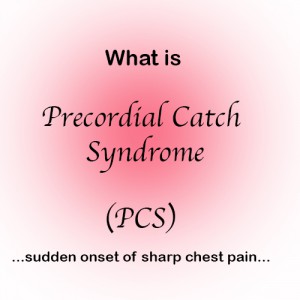 1. Precordial catch syndrome
1. Precordial catch syndrome
The phenomenom known as ‘precordial catch syndrome’ is also known as ‘Texidor’s twinge’. It is a quite common cause of chest pain especially in children and young adults. It does occur in adults but it is less frequent. This can be quite a frightening experience because the first thing that people think of with chest pain is ‘am I having a heart attack’.
PCS manifests itself as being a very sharp and intense pain mostly felt on the left side of the chest. It appears to generate from the cartilage between the sternum and rib cage and the pain seems to increase when taking a breath. The normal reaction is to take a deep breath and this evidently makes the pain worse.
The symptoms are described as being like a bubble popping or a cracking sensation after which the pain can subside. The problem is, many sufferers think they are experiencing a heart attack which causes them to panic.
Harmless – no medication necessary!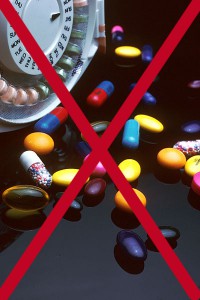
The pain only usually lasts for a minute or two and sometimes just a few seconds. Occasionally it can last for a lot longer and persist for half an hour or so. Some patients suffer this phenomenon on a daily basis and some less frequently with months or even years between episodes. In the majority of cases the pain diminishes completely and no medication is necessary. There is no known treatment or cure for this condition but knowing that it is harmless is comforting.(1)
Although close to the heart, the condition is not thought to be of cardiac origin and it is not dangerous or life threatening. It is thought though, to be related to stressful situations and anxiety, despite many sufferers being in a relaxed state or lying down when the attack happens.
One theory is that the condition may be because of cramping in the chest from the compression of a nerve with a subsequent muscle spasm in the intercostal region. Muscle spasms can be alleviated with magnesium supplementation as it is a wonderful muscle relaxant.
2. The Devil’s Grip

“The Devil’s Grip” is a rather antequated but entirely legitimate medical term for a quite rare condition that can cause excruciatingly intense chest pain. It seems to intensify when breathing in deeply and with movement and the area is often sore to the touch.
Officially known as ‘Bornholm disease’ but often called Bamble disease and sometimes Sylvest’s disease. Bamble is a town in Telemark county, Norway where the disease was first recorded in 1872 by a chap called Daae. Sixty years later, there was a case recorded on Bornholm, an island belonging to Denmark. A Danish doctor called Sylvest then named the condition after the island in 1930. Others know it as epidemic pleurodynia, epidemic myalgia or epidemic benign dry pleurisy.
Symptoms of Bornholm disease
Symptoms are various but the main problem is a severe sharp pain in the chest. There is often a cough and a slight fever with the condition. The pain generally seems to be towards the right side of the heart but sometimes can radiate up the left side of the chest to the shoulder. The slightest movement of the ribcage or breathing in, seems to increase the pain. It is often felt in the tummy area, muscles and there can be a sore throat and headache along with the fever. This pain comes and goes in episodes lasting 15 – 30 minutes. The onset is usually sudden and can persist for a few days before subsiding. It is possible that the condition can reoccur, but its not generally the case.
What causes it?
This seems to be associated with a virus called Coxsackie B virus. It attacks the muscles between the ribs, killing cells and causing inflammation. (If muscles are involved then Mg supplementation will help.) This virus can easily spread from one person to another. The virus lives in the intestines and is contracted by other victims because of poor handwashing or contamination. It can be spread easily through coughing and sneezing so whilst infected, kissing is a no no as well as sharing utensils, drinking from the same cup/glass. It’s good practice to make sure that the sufferer has his/her own mug/cup/glass etc., for the time they are infected, which shouldn’t be too long.
Pain relief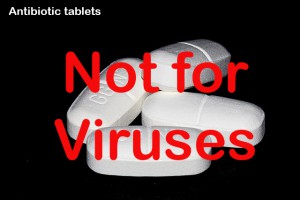
As for pain relief, ibupropen and other anti inflammatories are usually prescribed. As I mentioned earlier, Mg supplements will always help muscle spasms and muscles are involved in the pain of this condition. Remember, this is a virus, antibiotics will not help, they are for bacterial infections.
How long will it last?
The condition generally lasts for under a week and sometimes as little as 2 days. The majority of cases seem to affect those under 30 years. Most people, if they have a good immune system, will not get the full force of this condition but will feel like they have mild flulike symptoms. Outbreaks can occur within communities such as schools or nurseries, and more often during the summer and autumn. Outbreaks have occured in laboratories dealing with the Coxsackie B virus.
Misdiagnosis
The problem with Bornholm disease is it’s quite rare and therefore can be misdiagnosed or not diagnosed at all! It can be disconcerting for the patient when his doctor doesn’t know what he has, often after going through numerous tests. The upside of it is that usually ECGs and other heart health tests are nearly always normal and this can be a relief to the sufferer. At least he/she knows it’s not a heart attack!
 Please comment if you have any useful information which could be of help to other sufferers. I look forward to hearing from you.
Please comment if you have any useful information which could be of help to other sufferers. I look forward to hearing from you.
Ches Power
- Gumbiner CH (January 2003). “Precordial catch syndrome”. Southern Medical Journal 96 (1): 38–41.
Spread the word!

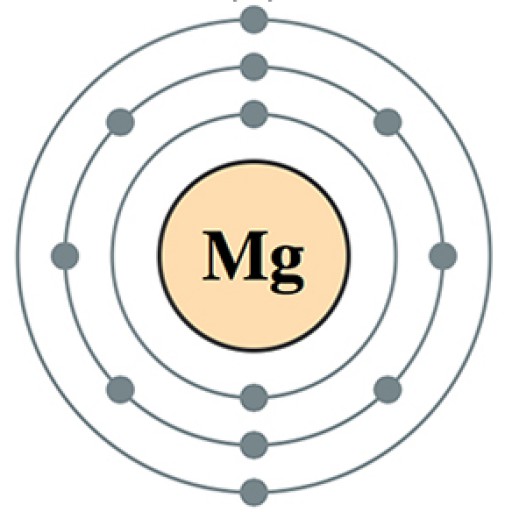
Thank you for covering the benefits of Magnesium! I have the magnesium books and rubbing magnesium lotion on my muscles help and it also helps my anxiety. My doctor told me that more people end of at the emergency room with anxiety, because they think they are having a heart attack. I do agree it is better to go and have your heart check if you have chest pain. I use magnesium externally, because the magnesium supplements can upset the stomach. The magnesium lotion or oil bypasses the stomach. It certainly helps to calm the nerves. I love all the Magnesium books out there. I have Mark Sircus’ book too. I read as much as I can about.
I loved your post and heart disease is prevalent in our society. My mom and most of her sisters have heart problems. I appreciate you posting about this.
Angie
Hi Angie and thanks for reading the post on chest pain. Many people use magnesium topically and that’s great, it is a good way of getting this nutrient straight into the body missing the digestive system and hence not laxative. Have you every tried the magnesium chloride solution? Dr Carolyn Dean does one called ReMag and I have another on my website. This magnesium salt does not have a laxative effect unless used in large quantities. The trick is to start with it very slowly, ie putting a dose in a good quantity of water and drink it during the day. I think you’ll find it won’t upset the tummy taken this way. It’s also a good way of getting more water into you!
If your mom and aunties have heart problems, please get them to read What is Calcification? and make sure they are not taking calcium supplements if they already drink milk and eat dairy products. Good health to you and keep taking the magnesium! Ches
Hello, Chessie,
I´ve just been to a nutrition specialist this week.
She told me that if she had to choose one single elment to supplenet to a patient without any test information, she would choose magnesium.
She said: “Magnesium would be my best shot in the dark, if I had to do it”.
So, I find your article very relevant since, according to her, that is the most needed supplement among people these days.
Cheers
Well that’s gratifying to me, knowing there are professionals out there who are advocating this amazing mineral. I know they are thin on the ground but hopefully knowledge of Mg will grow quickly. I sincerely hope you do as she suggests and start repleting your stores of Mg with Mg rich foods and supplements. Please make sure your Calcium levels aren’t too high. Ca to Mg ratio optimum is 1:1 and this is quite difficult to achieve. If you take in too much Ca and not enough Mg then your Mg will be deficient by default. Good health to you and thanks for the positive comment and making my day! Ches
Hey there Chessie! Intriguing article on causes of chest pain I never new that the regulation of magnesium levels in the blood had an effect on chest and lung health.
I am asthmatic and stopped using an asthma pump ever since I started using medical marijuana smoke. I wonder if this will have long term effects on my lung health.
Hi there and thanks for reading the article. If you’re asthmatic, you would greatly benefit from taking a Mg supplement as many studies have linked Mg deficiency to lung disorders. Asthma is quite often triggered when levels of histamines and stress hormones are elevated which causes muscle spasms and inflammation which of course narrows the airways. It may be worth you trying it but at the same time leaving off the marijuana because that will only deplete Mg levels more. Marijuana may relieve but it won’t cure. With Magnesium in plentiful supply in your body you may find your asthma starts to decline and eventually disappear! Make sure your Calcium intake isn’t too high. An imbalance of high Ca to low Mg will definitely cause problems. If you take a look at Best Magnesium Supplements this will give you information of which Mg supplement would be best for you. Go for it, you won’t regret it! Here’s to you being Asthma free! Ches
This post was really interesting.
We hear constantly in the media that heart disease is on the increase and this leaves many people nervous when they experience any form of chest pain.
Yes, chest pain might be related to a heart condition but there are other reasons that can cause this pain and this well-written and informative post should help to give people a bigger picture view of their overall health.
Thanks for your comment Braxa. There are many causes of chest pain but they don’t all have to be related to a diseased heart. We must still keep ourselves fit though and do our best to protect ourselves from cardiovascular conditions. Best Magnesium Supplements is an excellent way to protect us all. Ches
This was very interesting to read. I have heard once before that almost everyone in the U.S is magnesium deficient; which causes problems for many people. I did hear though that soaking in espom salts is one way to help alleviate magnesium deficiency; do you think a person can absorb enough through their skin to be helpful? Thanks!
Hi Shelby and thanks for reading the post. You’re right about soaking in Epsom salts (another term for Mg sulphate). Indeed, it will penetrate the skin because the molecule is so small that it can get into the blood stream. This will stop any laxative effect which some compounds of Mg will induce if taken orally, but not all! Trouble with topical supplementation, it can be a bind to do it on a daily basis and many would prefer to pop a pill (not Mg oxide) or take some Mg citrate powder in their food. For me, I take 3-4 doses of Mg chloride solution (150mg or 1/2 teaspoon per dose) into a litre jug of water and then drink it throughout the day. I also take a glassful out of the jug to bed. It really helps you sleep! Ches
I haven’t personally ever suffered from any form of acute chest pain, but I know that if I ever do, I can’t just suffer in silence. As the article shows, there are so many things that it can be, and it doesn’t have to be a heart attack or even heart-related. So my message to anyone reading this who is struggling: don’t hesitate, and get to see a doctor, there are plenty of causes which can be easily treated and make you better – and if it is more serious, prompt action can make a big difference to you, too.
Thanks Molly for your input. You’re right of course, prompt action is always the best way and if you’re unlucky and are actually suffering from a heart attack, or a precursor to one, then more can be done if you get help quickly. Ches